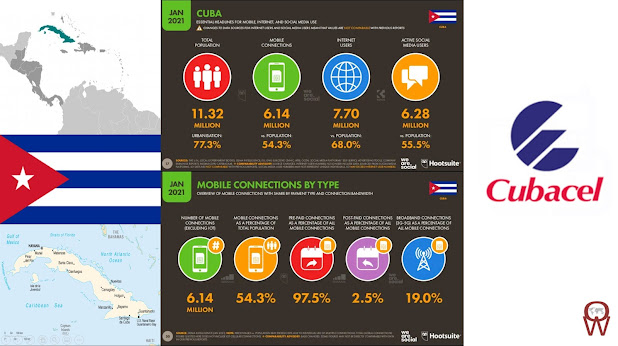Cuba’s telecom sector is a unique one with state control having stymied rather than promoted the development of all sectors. The country has the lowest mobile phone and internet penetration rates in the region, while fixed-line teledensity is also very low. Fixed-line and mobile services remain a monopoly of the government-controlled Empresa de Telecomunicaciones de Cuba (ETESCA Cubacel).
Although there are still state restrictions over the right to own and use certain communications services, a thawing of relations between the US and Cuba has encouraged the government to improve access to services. Since 2015 Wi-Fi hotspots have been put in a number of places and since 2019, Cuba's Ministry of Communications (Mincom) has allowed individuals to create small private not-for-profit Wi-Fi networks and to import equipment.
Access to sites is also tightly controlled and censored. A DSL service was launched in March 2017 in areas of Havana and has since been expanded though costs have been set too high for most Cubans able to access the service. However, in 2019 Google and ETECSA signed an agreement to improve access for Cuba’s internet users by setting up a cost-free and direct connection between their respective networks.
Similarly, LTE services have been launched, with over 473 LTE base stations having been built across the island by the end of 2019. The mobile user base has grown to over six million, 70% of which are smartphone users.
Many consider Cubacel the only mobile provider in Cuba as the other C-com stays invisible. Cubacel started with a TDMA-network on 800 MHz which was decommissioned in 2009.
It's GSM-based network on 900 MHz nationwide for 2G with additional spectrum on 850 MHz in La Habana (= Havana), Varadero, Ciego de Ávila, Cayo Coco, Cayo Guillermo and Holguín (at the airport and Guardalavaca).
In 2017 Cuba’s state-owned telecoms operator ETECSA has announced that its customers are from now on able to send text messages to any mobile phone in the US and anywhere else. The cost is CUC 0.60 (US$ 0.60), with ETECSA stating that the charge is "similar to other international destinations".
In 2018 about 789 3G stations on 900 and 2100 MHz covered about 68% of the population and in 2019 this has grown to 85% of the population. The company intends to continue focusing on capacity expansion with a view to reducing prices and adding more users, although accessing mobile devices is a problem due to the ongoing US embargo.
In 2018 ETECSA also started to deploy 4G/LTE on 1800 MHz (B3). The operator has begun trials of 4G technology in northern Havana and in tourist hubs like Varadero, Cardenas, Mariel and Bauta. This trial 4G service is currently only available to some roaming customers and selected high-usage customers who consume over 1.5 GB of data a month, have compatible handsets and spend ‘significant amounts of time’ in coverage areas. ETECSA is aiming to bring 4G mobile services to all of the country’s 15 provincial capitals by the end of 2019.
In 2019 ETECSA has also unveiled new 4G/LTE mobile packages for prepaid customers, at the same time revealing that 3 million of its wireless lines were accessing mobile data services, following the commercial launch of 3G in December last year. The operator’s LTE network, meanwhile, was activated in the first half of 2019, but was initially restricted to selected high-usage customers. This service was opened up to prepaid users in October in the provinces of Havana, Matanzas, Mayabeque, Artemisa, Camaguey, Ciego de Avila, Holguin, Granma, Las Tunas, Guantanamo and Santiago de Cuba.
ETECSA has installed a total of 3,268 mobile base stations across the island, of which 1,357 are 2G, 1,438 3G and 473 are 4G base stations. The LTE total is expected to reach 500 by year-end, located in all provinces except Cienfuegos, which will be upgraded to enable 4G access next year.
Some 4.4 million Cubans used mobile internet services in 2020, while the number of cell phone users rose to 6.6 million, according to officials from the ETECSA.


No comments:
Post a Comment